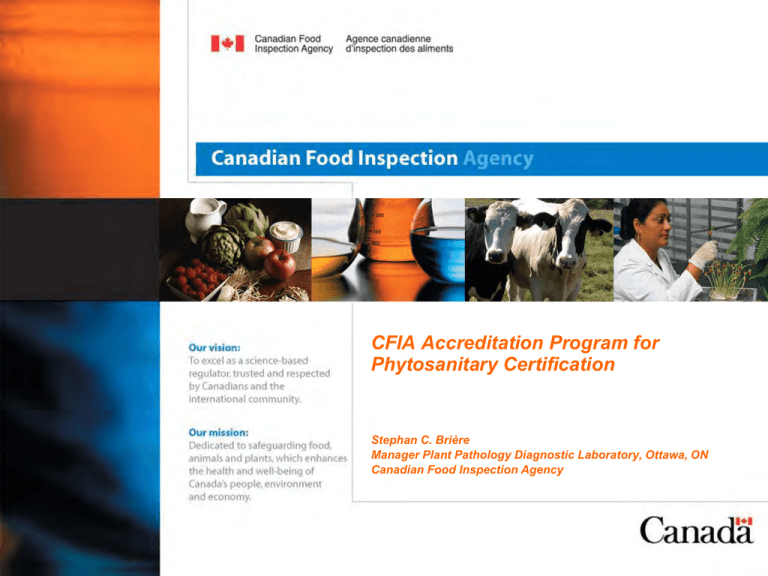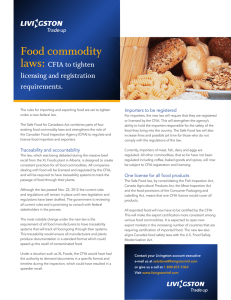CFIA Accreditation Program for Phytosanitary Certification
advertisement

CFIA Accreditation Program for Phytosanitary Certification Stephan C. Brière Manager Plant Pathology Diagnostic Laboratory, Ottawa, ON Canadian Food Inspection Agency Introduction CFIA Science Branch (SB) has responsibility for laboratories conducting testing and related activities that are used by the Canadian Food Inspection Agency (CFIA) to verify that national and international standards for food safety, animal health, and plant protection are met. Monitoring the effectiveness of laboratories in producing valid test results contributes to the overall objectives of the Agency in food safety, animal health and plant protection. 1 1CFIA Framework for Quality Management Oversight of Laboratories Conducting Testing in Areas Under the CFIA Mandate CFIA laboratories deliver an extensive range of testing services to meet domestic and international standards, requirements and obligations however there is also a significant volume of testing provided by external laboratories. External laboratories may be providing services under contract to the CFIA or they may be providing testing directly to producers who use the results to demonstrate their products' compliance with national or international regulations and obligations. CFIA is responsible for the validity of laboratory results produced in CFIA laboratories. In its oversight role, the Agency also assumes a degree of responsibility and liability when results from external laboratories are used to verify compliance, e.g. to authorize exports and issue required certificates. As a Canadian competent authority in food safety, animal health and plant protection, CFIA is accountable nationally and internationally when issues arise in these areas. Included in a number of the Acts and Regulations that the CFIA administers and has authority to enforce, is the authority to approve or accredit laboratories. The legislation, specifically the CFIA Act, gives the CFIA authority to enter into arrangements with other government departments in Canada and other organizations in order to carry out its responsibilities under the Acts and Regulations that it administers, including arrangements related to accrediting or approving laboratories. CFIA Seed Laboratory Accreditation and Audit Protocol (SEED LAAP): For Purity, Germination & True Loose Smut Testing SEED LAAP protocol is currently under it’s 5th revision The principle requirements for a seed testing laboratory wishing to be accredited and maintain its accreditation under this protocol are listed in Section 7 and are verified by an on-site audit. They include Management Requirements and Technical Requirements These requirements are based on the ISO 17025 Accreditation Standard. 6 CFIA SEED LAAP Requirements In addition the laboratory must demonstrate its capability to perform the specific tests for which accreditation is requested (pre-accreditation samples). Laboratories, which meet and maintain the requirements of the Seed LAAP, will be considered to have demonstrated their ability to perform and maintain competence in seed testing by ensuring they have: • Technically competent staff with the requisite skills and knowledge • A lab environment with the requisite facilities and equipment • Followed the requisite procedures • Implemented the requisite quality management system 7 Purpose of the CFIA Seed Laboratory Accreditation Program To provide a standardized and technically sound process to ensure the validity of results which must be used for the grading of seed and may be used to assess whether imported seed lots meet minimum requirements. To identify laboratories which are deemed competent to perform accredited tests. To add credibility and recognize competent laboratories. 8 Purpose of the CFIA Seed Laboratory Accreditation Program…cond’t To facilitate laboratory continual improvement by promoting quality control practices such as: • Identification and correction of quality control deficiencies • Identification and correction of methodology deficiencies • Identification of training needs • Confirmation of performance specifications in an operating laboratory environment To promote the acceptance of an accredited laboratory’s results. To facilitate domestic and international trade through acceptance of test data from accredited laboratories. 9 CFIA Seed Phytosanitary Program Canary Seed Export Program to Mexico initiated in 2011 The CFIA currently has one seed export program in which the CFIA supervises an accreditation program for the phytosanitary certification of seed exports The requirements for the accredited seed labs were written as an addendum to the Seed Lab Accreditation and Audit Program (Seed LAAP). If this pilot is expanded to included other commodities/seed or grain to other countries it may have different requirements than this pilot. Program conforms to NAPPO RSPM 9 (The Authorization of Laboratories for Phytosanitary Testing) 10 Canary Seed Canary (Phalaris canariensis) Phytosanitary Assessments by Accredited Private Laboratories Last year (2014/15) 500 phytosanitary certifications issued for canaryseed to Mexico • Typically one phyto issued for each railcar shipped (either bulk in hopper bottom railcars approx. 90 mt or bagged product in boxcars approx. 70 mt). • Annual commodity value of $30million • No significant issues have been reported • There are 4 CFIA accredited laboratories performing the work under section 7 of the LAAP. 11 12

